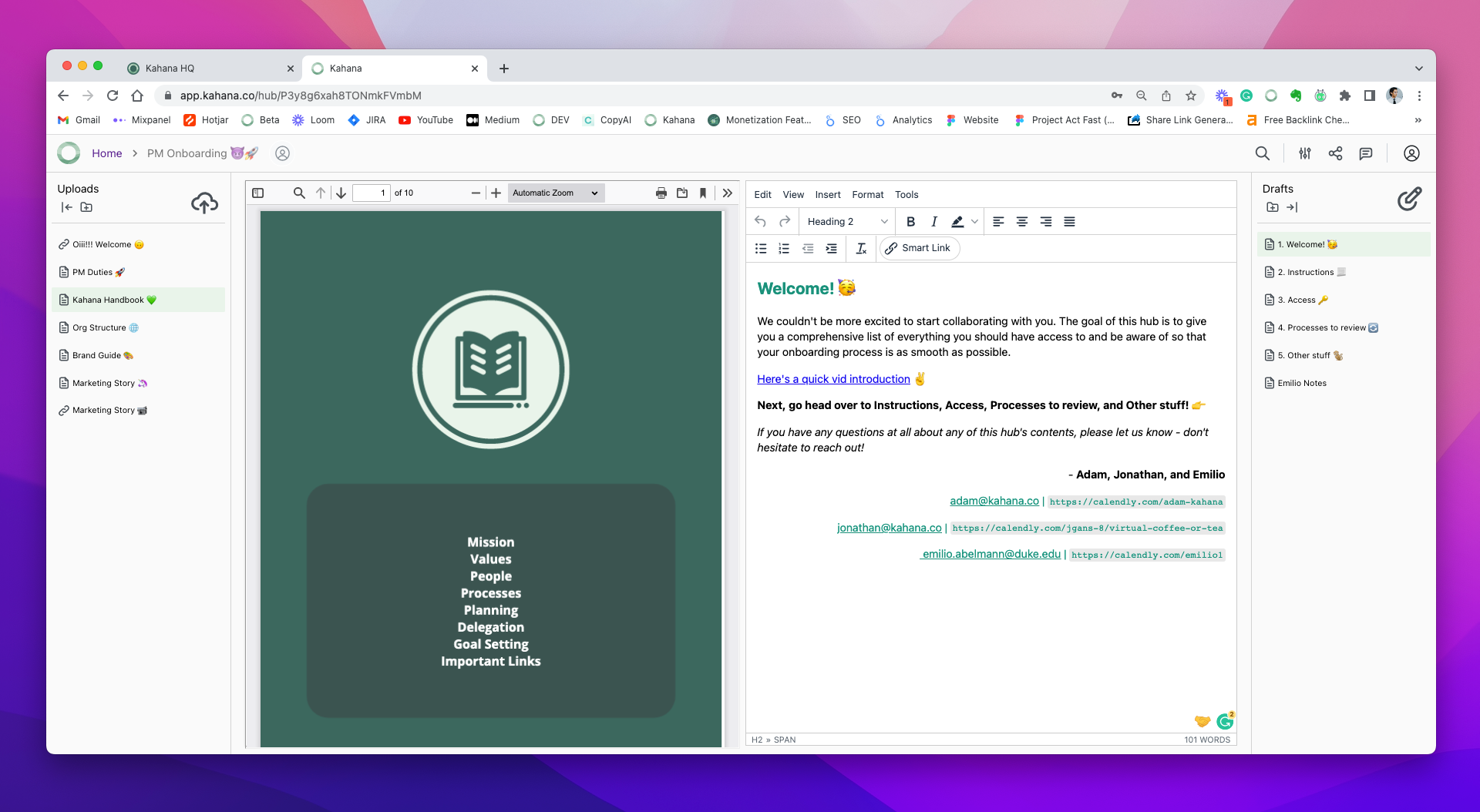Best Company Wiki Templates, Examples & Software [2025]

Topics covered ✅
- Company wiki example
- Company wiki open-source
- Company wiki software
- Free company wiki
- Company wiki Notion
- Best company wiki
- Company wiki Google
- Company wiki template
Honestly, enough is enough.
Are you tired of having to track down all your company’s disparate information about processes and sub-processes in different places?
Do you wish everyone would just think long-term and use the same platform to gather tribal knowledge instead of burying it in email threads and private Slack channels?
When you operate a company, you want to rest assured that newly onboarded employees and contractors have all the access they need to get up to speed on rich company-specific information and prior knowledge.
And to add to the importance of this concept, if you weren’t aware, unshared knowledge costs money.
For context, the average employee spends approximately:
- 28% of the workweek managing e-mail
- 20% of the workweek looking for internal information or tracking down colleagues who can help with specific tasks
In this article, we’ll break down how we tackled the issue of unshared knowledge at Kahana and how we built an internal company wiki to both protect against the leakage of day-to-day knowledge and use it as a strategic advantage (more on this later).

Claim My Free Company Wiki Template
This hub is ready-made and structured as an out-of-the-box company wiki that you can populate and use to collaborate.
1. Our Internal Company Wiki
The Kahana internal company wiki contains all company, processes, policies, engineering documentation, and internal knowledge that may not be found elsewhere.
It's our single source of truth for every single person who is an employee, contractor, and in some cases, even people who are part of our community.
The wiki is a great way for us to keep track of our teams' work, as well as all of the interesting things happening within the organization.
You can find out what everyone else is working on without having to interrupt them or bother them with questions—you just drop into their hubs.
In the past, we felt like we were letting valuable knowledge slip through the cracks of our email threads and Slack channels, but after we implemented our company wiki with Notion and Kahana, we are confident that our information and intellectual property are unified, accessible, and protected.
We're super excited about the company wiki we’ve built and we hope you are too. That’s why we are making it available for anyone to use and customize for themselves.
2. Company
When a company or brand grows, it's easy to lose sight of what you know on a day-to-day basis.
As more and more people come on board, the amount of knowledge that gets spread out across the company increases and becomes less condensed.
This can lead to a lot of basic questions about how processes work, which can slow down the productivity of your team.
Sometimes, new people feel downright awkward about asking a question because they are afraid it’s already common knowledge.
It’s not rocket science: a company wiki simply allows people to get up to speed and ask smarter questions faster.
It allows people to make an impact faster and have more fun in strategic meetings where actual work gets done, instead of one person having to re-explain everything over and over again every time another person can’t make the meeting.
People really value and enjoy a repository of information that they can sit with and learn from early on in their experience with a new company (or even a company they’ve been with for years).
Here’s a real use case of the Kahana company wiki — one of our newly onboarded engineers wasn’t sure if the marketing team was aware of a proven list of Growth Hacking Plans that he had used in the past, so he shared it in Slack with a manager.
The manager realized the nearly 500-page PDF of growth hacks was so tactically valuable that it shouldn’t go unshared and immediately dragged and dropped it into a hub.
From there, it became widely accessible and allowed people on the marketing and strategic partnerships team to actually go collaborate and implement the growth hacks, instead of letting the fantastic idea collect dust in a private Slack message.
3. Knowledge Base
Our knowledge base at Kahana lets every employee contribute to a single, unified hub centered on a core process.
Structurally it is intuitive — you can see every company process on one page and when you click one there’s an individual hub associated with it, filled with PDFs, videos, notes, and more.
It's easy and fun for anyone to use and get started, but can also be customized by any team for specific needs or projects.
At the hub level, as an administrator or owner, you can collaborate and manage the roles and permissions of your employees, contractors, or freelancers.
It’s straightforward to get everyone the exact access and credentials they need to do their jobs.
4. Source of Truth
Most companies have an internal wiki. But do they have a single source of truth?
What if we told you that you can get rid of all the content gaps and knowledge silos and have a single source of truth?
No more playing Sherlock Holmes and investigating email chains, or having entire projects dedicated to auditing previous projects about why something was done, who did it, and how to do it yourself.
You can just make effective knowledge transfer easy.
Our internal wiki template will help you and others hit the ground running and stay up-to-date with the latest policies, procedures, and other essential information about your company.
It's designed to make sure that everyone has access to the right information at any time about any project or initiative.
This will give you a strategic advantage when hiring new employees (because they can see how they can make an impact quickly) and onboarding them faster (to realize said impact).
It will help with day-to-day collaboration, interaction, and all work in general.
5. Company Wiki
If you work at a small company, you might be asking yourself why you need an internal wiki.
Well, we're here to tell you that even if you have only 5 employees or fewer, even if you are a solopreneur, there are massive benefits to having a central hub for everything related to your business.
Having processes in place, time and time again is a key indicator of preparedness to grow as an organization. People can’t make an impact on a project or process they don’t know about.
If your team is spread out across multiple locations—even if it's just one other office—having access to the same information at all times makes it easier for everyone to be on the same page and get things done faster.
That being said, even if you're a large company with hundreds or thousands of employees, an internal wiki can still be useful because it allows everyone in the organization easy access to information in a modular way.
When it comes to a large enterprise, the company wiki should be structurally intuitive to prevent the creation of knowledge silos.
That’s why we created our internal knowledge base to essentially exist with only 2 hierarchies: the process and the hub.
While the actual process may have various employees of different levels operating in tandem to execute, the information about the hub is not siloed or striated.
6. Single Source
Have you ever been in a meeting with your team and thought, "I'm not sure if I have the most up-to-date information here"?
If so, you're not alone. It's hard to keep track of everything that goes on at work, especially when it's spread across multiple documents and even multiple teams.
And when you're working with your team on a project, it can be even more difficult to make sure everyone has every detail they need about what's going on with the project.
Having an internal company wiki and a known operating standard to refresh it and add to it on a day-to-day basis will give you the confidence that you know the information is up-to-date, or at least it should be.
It’s good company hygiene to encourage people to continuously update and contribute to its process hubs. It has a direct impact on everyone’s ability to function.
Anyone at any level should be able to contribute to a company wiki—from employees all the way up to management.
You can use it as a single source of truth for company policies, or just store important documents there so everyone has access to them no matter where they are.
7. Team
Your organizational knowledge needs to be holistic and flat.
The company wiki serves as a go-to place for anyone who has questions about how things work or needs the most recent information.
If you have a question about something, you will be able to find the answer in seconds rather than searching through endless documents.
And if you can’t find something, you can then reach out to the person who most likely knows the answer, without appearing lazy or inconsiderate for not first checking yourself.
For example, nobody likes when they painstakingly create a guide or checklist for others to reference, and then they keep getting the same questions over and over again.
A company wiki holds people accountable to self-educate themselves so others can focus on important work-at-hand.
Of course, meetings and collaboration are important, but everyone knows meetings are most effective when they are focused on strategy or tactics and aren’t just a “learning session” that could have been accomplished by simply looking at a hub for 15-20 minutes prior to the meeting.

Claim My Free Team Onboarding Template
This free team onboarding template comes ready-made and populated with documentation, resources, and materials.
8. Content in One Place
An internal wiki has many benefits simply because it allows you to have critical content in one place.
Here is a short list:
- Improved efficiency - You don't have to waste time searching the web or checking multiple sources of information when you need to find something out. All information is in one place, so it's easy to find what you need. You can also ask questions about it without having to go through several people for answers before someone who knows the answer comes along.
- Improved accuracy - There's no possibility of miscommunication or misinterpretation of what's written down—and everyone can see it at once if something needs changing or updating during regular check-ins.
- Improved consistency - When everyone knows where they can go for answers or context on any given topic (and doesn't have to rely on their memory or second-hand information), there are fewer inconsistencies across departments and teams within the organization.
For example, our own support teams get a lot of insights from sitting with users and having creative sessions about how to use hubs, and now, so does our engineering team.
Our company wiki allows all cross-functional teams, especially product marketing, to have access to everything they need for communicating with potential users and current users about upcoming releases.
What about the marketing team that is preparing for a new social media campaign focused on educating people about new features?
They also have all the content in one place - it’s in the hub.
9. Base
Kahana has a huge base of information that can help everyone stay informed and keeps our teams running smoothly.
For example, new interns or employees of Kahana use the wiki to learn about our history, and see not only what other teams have accomplished, but how.
The wiki also helps educate people about the most recent hourly updates about our products and services, as they are enhanced and improved in real time.
We've seen some companies that are in the process of mapping out their processes and investing heavily into documenting SOPs to ultimately operate more efficiently.
And we've seen other companies that struggle to transition to a lean, process-oriented culture because it’s too difficult to get everyone on board and it feels easier to do what’s always been done.
However, we took this into account when we designed our company wiki because it doesn’t take any time to use and the pitch to our team is easy: just drag and drop stuff into the wiki or type notes in there!
A wiki doesn’t have to be neat at first.
It can be messy.
The important thing is ensuring the raw, valuable information generated on a daily basis doesn’t slip through the cracks.
10. Company Culture
Our internal wiki is available for all private companies to leverage as a template and customize to match their own unique functions and processes—and even if you're not sure if it's right for you yet, why not give us a try?
In a nutshell, you can use it to:
- Have a living and breathing record of your company's history
- Share the latest cross-functional news between your people
- Have peace of mind that your information is being documented
- Streamline onboarding
- Make auditing internal processes easier
11. Source
The best way to ensure that your company's internal knowledge base is kept up-to-date and accessible is with an internal wiki.
A wiki is a single source of truth that your team can use to keep track of things like company policies and procedures, engineering projects, product roadmaps, and more.
According to Panopto’s Valuing Workplace Knowledge study, this will increase production, and organization, and allow for a happier workplace overall.
In our previous article about why effective knowledge sharing saves millions, we covered two important statistics to keep in mind about the real cost that underlies inefficient knowledge management.
So if you would like some background, we recommend checking that out.

Talk with a Kahana representative
Fill out your information and a Kahana team representative will reach out to you. Have a simple question? Search our library of articles
